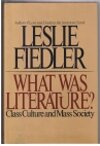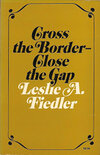Leslie A. Fiedler (1917–2003)
Author of Love and Death in the American Novel
About the Author
Leslie A. Fiedler, a literary critic, was a professor of English at the State University of New York, at Buffalo. His well-known preoccupation with social and psychological issues emerged with Love and Death in the American Novel (1960), which became a major critical text of the 1960s. In this book show more he argued that American writing has been shaped by an inability to portray mature sexual relationships and by an underlying fear of death. Fiedler admonished critics, teachers, and readers of literature to connect text and context-to consider a poem, for example, as the sum of many contexts, including its genre, the other works of the author, the other works of his time, and so forth. Fiedler's notions of moral ambiguity echo Matthew Arnold's focus on art as criticism of life, but with an energy and style peculiar to himself. Fiedler depended greatly on generalizations (usually unexpected), making his critical remarks reflect broader considerations. (Bowker Author Biography) show less
Image credit: lifeinlegacy.com
Works by Leslie A. Fiedler
The inadvertent epic: From Uncle Tom's Cabin to Roots (Massey lecture series ; 17th) (1979) 13 copies
The Second Stone: A Love Story 6 copies
O Brave New World: American Literature from 1600 to 1840 (A Critical Anthology of American Literature, Volume One) (1968) 6 copies
Collected Essays of Leslie Fiedler 4 copies
Back to China 3 copies
The Art of the Essay 1 copy
The Monks of Monk Hall 1 copy
Lo straniero in Shakespeare 1 copy
Associated Works
Literature: An Introduction to Fiction, Poetry, and Drama (1995) — Contributor, some editions — 958 copies, 7 reviews
Adventures of Huckleberry Finn [Norton Critical Edition, 2nd ed.] (1977) — Contributor — 301 copies, 4 reviews
Beyond the Looking Glass: Extraordinary Works of Fairy Tale & Fantasy (1985) — Introduction — 167 copies, 6 reviews
Alger Hiss, Whittaker Chambers, and the Schism in the American Soul (2002) — Contributor — 25 copies, 1 review
Tagged
Common Knowledge
- Canonical name
- Fiedler, Leslie A.
- Legal name
- Fiedler, Leslie Aaron
- Birthdate
- 1917-03-08
- Date of death
- 2003-01-29
- Burial location
- Forest Lawn Cemetery, Buffalo, New York, USA
- Gender
- male
- Nationality
- USA
- Birthplace
- Newark, New Jersey, USA
- Place of death
- Buffalo, New York, USA
- Places of residence
- Buffalo, New York, USA
Missoula, Montana, USA
East Orange, New Jersey, USA - Education
- New York University (BA | 1938)
University of Wisconsin-Madison (MA | 1939 | PhD | 1941) - Occupations
- professor
literary critic
novelist - Organizations
- State University of New York at Buffalo
Young Communist League
United States Navy (WWII) - Awards and honors
- American Academy of Arts and Letters Academy Award (Literature, 1957)
American Academy of Arts and Letters (Literature ∙ 1988)
Hubbell Medal (1994)
Ivan Sandrof Lifetime Achievement Award (1998)
Members
Reviews
Lists
Awards
You May Also Like
Associated Authors
Statistics
- Works
- 44
- Also by
- 23
- Members
- 1,311
- Popularity
- #19,589
- Rating
- 3.8
- Reviews
- 7
- ISBNs
- 61
- Languages
- 2
- Favorited
- 1















